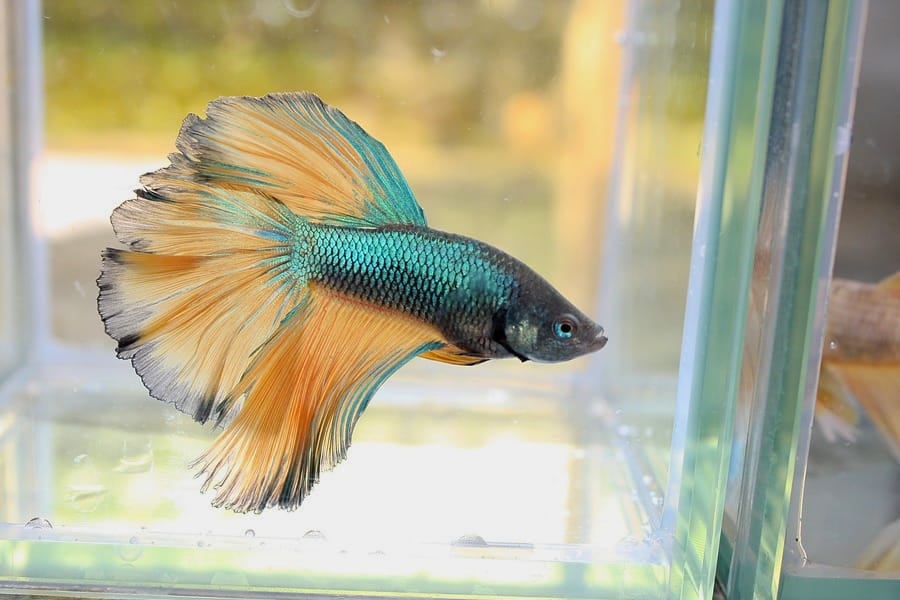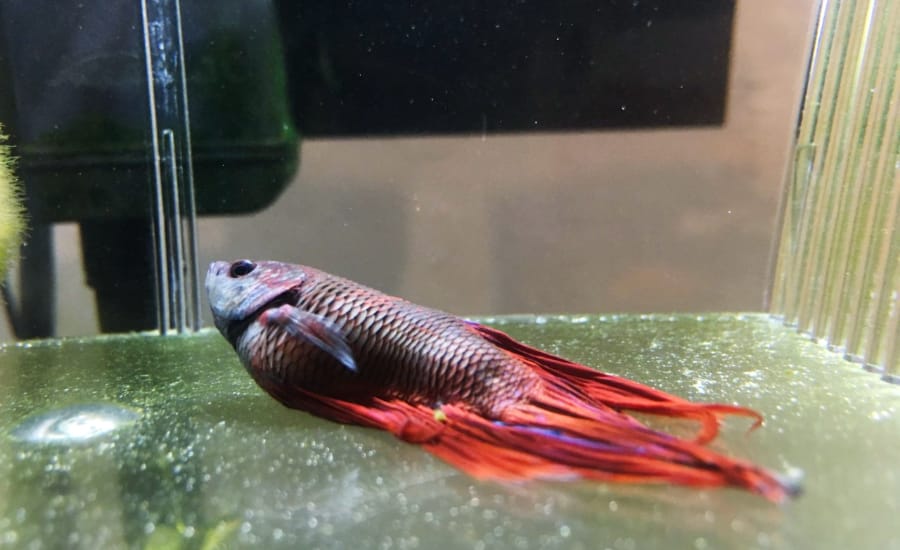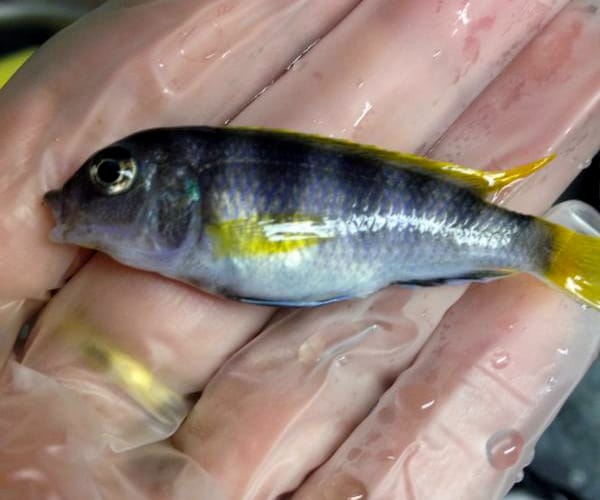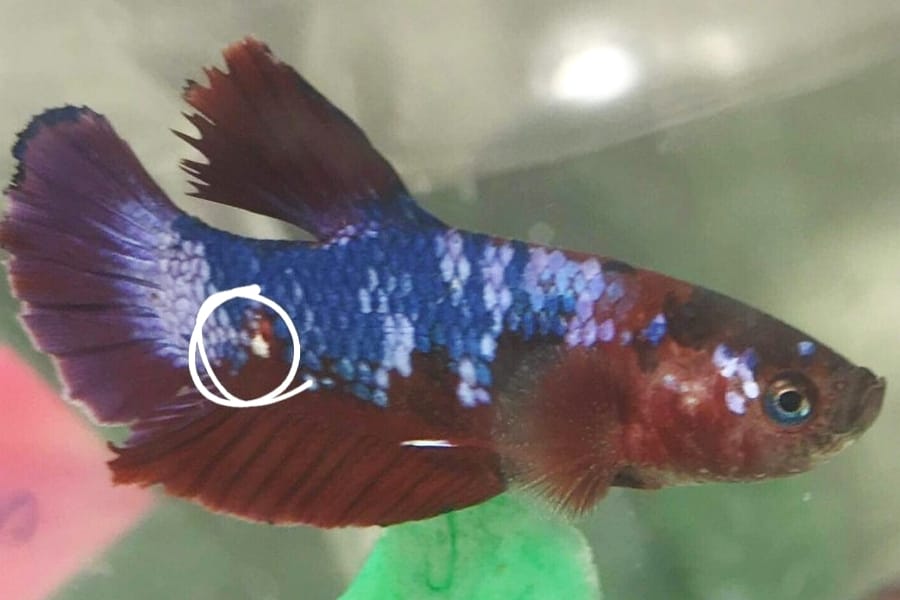Many people choose betta fish as pets because of their beauty. Its beautiful color and lively behavior make people love to keep them.
Besides, some people choose to raise betta fish as a hobby to relieve stress. Therefore, it is not surprising that betta fish sales continue to increase every year.
However, you may be confused when you find your lovely betta fish, which is usually healthy and lively, turning into a puffy and limp. The cause of this condition is most likely a bloated belly.
If you find this condition, you should not be worry too much because a bloated stomach is one of the most common diseases affecting betta fish.
A bloating betta fish will appear to have an enlarged and protruding belly. This condition can then affect one or both sides of the fish. Also, there are times when it causes the fish to appear tilted or unbalanced when swimming.
In other words, a bloated betta fish can also have difficulty in swimming. It can lead them to get trapped on the surface or bottom of the tank. If this happens, it can harm your betta fish because betta fish must swim to the surface frequently to collect oxygen from the surface.
If this condition happens to your betta fish, you don’t have to panic. It is because not all bloated belly conditions indicate serious problems. There are times when the disease can heal on its own or with the help of medication. In other words, you first need to know the cause before taking any action.
So, what is the cause of the bloated belly on a betta fish? How to cure it? Can we prevent the bloated stomach on a betta fish? To answer some of these questions, you might consider some of the following discussion below.
The Symptoms, Cause, and Treatment for Betta Fish Bloated Belly
As we have discussed above, the most visible symptom of this disease is the change of the betta fish’s body shape, which looks bloated, especially in the fish’s belly. Then, this condition following the fish’s difficulty in swimming and breathing.
Another symptom you need to pay attention to is the problem with the fish appetite. Bettas are greedy fish. Moreover, the betta fish bloated belly can cause the fish to lose appetite. Also, in some cases, fish may not even want to eat at all.
Besides, the symptoms that appear also depend on the cause of the bloated belly. One cause and another may have different symptoms. Also, it will affect the treatment you need to give to the fish.
Furthermore, to better understand the best prevention and treatment for bloated belly in betta fish, here are some explanations you need to know based on the cause.
Constipation

Constipation is one of the most common causes of bloat in bettas. However, if you are too late to treat it, this disease can cause complications. Some of the diseases that can appear due to constipation are swim bladder disorder and dropsy.
Since it’s a common disease, basically treating constipation in betta fish is pretty easy. However, if your betta gets dropsy, there is little chance for it to survive.
Therefore, before your fish get to that phase, you must treat it as soon as possible. That way, it will help the fish heal quicker. Also, you can prevent complications from spreading.
Find out more about the symptoms, causes and treatment for betta fish constipation in our in-depth article.
Swim Bladder

If it’s not constipated, the cause of bloated in your fish may be swim bladder disorder. However, as we discussed earlier, swim bladder disease is closely related to constipation. In other words, constipation can trigger swim bladder disease and vice versa.
Symptoms of Swim Bladder in Betta Fish
The most visible symptom is that the fish will have difficulty swimming. If you find that your betta is struggling with swimming with its side belly puffed up, your betta fish likely has swim bladder disease. Therefore, you need to be aware of your betta fish if it is seen swimming on its side.
Difficulty swimming is the most common symptom. In this case, the disease causes the fish to develop buoyancy problems which can cause them to sink to the bottom, get stuck on the surface, swim sideways, or remain in one position.
Besides, just like in the constipation case, betta fish that suffer from swim bladder disease also lose their appetite. This condition then can make them lethargic from being too full or in pain. It also the reason why they usually will appear to stay still in one position.
Furthermore, in more severe circumstances, swim bladder disease can also cause your betta to have a curved back. These conditions are certainly terrible for you to see. Therefore, you need to quickly take action so that the disease can be cured as soon as possible and does not increase the fish’s suffering.
Cause of Swim Bladder in Betta Fish
Besides constipation, several factors can also cause swim bladder disease in betta fish. One of them is injury.
In this case, the injury cause could be an attack from another fish, or it hurts itself in something in the tank. Moreover, injuries can also be caused by a betta fish that jumping out of the tank then get hurt when it landed on the surface.
Apart from injury, the causes of swim bladder disease can also be parasites and bacterial infections. To detect it, you can pay attention to the color of your betta fish droppings. If there is a bacterial infection, the fish droppings will look stringy and white instead of brown.
The third factor that can cause swim bladder disease in betta fish is shock. Some of the things that can cause shock in betta fish are temperature changes, changes in pH, and changes in lighting.
If those things happened constantly, they could cause shock and trigger swim bladder disease.
Treatment for Swim Bladder in Betta Fish
Before determining what you should do to take care of your betta fish’s swim bladder disease, you must first consider the cause. If the cause is overfeeding, the steps you need to do are the same as when dealing with constipation.
In general, the healing process will also not take too long.
If you find that your betta is suffering from a parasitic or bacterial infection, you need to immediately transfer the fish to the tank as soon as possible. Then, if the cause is bacteria, you can add Melafix to the water.
Meanwhile, if the cause is parasites, you can use Betamax. After that, watch the progress every day. However, cases of swim bladder disease due to bacterial and parasitic infections are quite rare.
Lastly, if the cause is shock, there is not much you can do. In this case, the only you can do is to keep the water temperature in the tank as stable as possible and turn off the lights. Turning off the light will help your betta to rest easier, which will help the healing process.
Dropsy

If the cause of your betta fish bloated belly isn’t constipation or swim bladder disease, the cause is likely dropsy. Unfortunately, if it is true that your betta fish has dropsy, it is unlikely that it will survive. Therefore, euthanasia is an option that you need to consider.
Symptoms of Dropsy in Betta Fish
If the scales on your betta appear to be sticking out in the wrong direction and making them look like pinecones, then it is likely that your betta fish has dropsy.
This condition happened because the fish’s internal organs are very damaged, causing the fish to swell and push their scales out.
Besides, dropsy also causes fish bones to curl outward due to swelling. The conditions were terrible. Also, if the spine is curved sideways and not vertical, this is a sign of tuberculosis.
In essence, when a fish get dropsy, it will be difficult to cure it because of severe internal organ damage.
Cause of Dropsy in Betta Fish
The causes of dropsy are various and can be hard to determine. However, the main cause is generally stress. In this case, stress can arise from poor water quality and diet. When experiencing stress, the fish’s immune system will decrease so that it is prone to disease.
Apart from stress, internal damage can also be a trigger for dropsy. For example, when a fish fights other fish or collides with a dangerous object in the tank, causing invisible deep wounds.
If the damage is too severe, the fish’s body’s organs and tissues will damage, swell, and rot. This condition then makes it difficult for the fish to recover.
Treatment for Dropsy in Betta Fish
The only treatment you can try to save your betta is by changing the water frequently and provide antibiotics.
Also, you can try to give methylene blue to the water. However, as we discussed above, the chances of a betta fish recovering from dropsy are small.
Malawi Bloat

If we compare it to the three causes of bloated belly above, cases of betta fish suffering from Malawi Bloat are quite rare.
However, unfortunately, when you see the signs that your betta fish has Malawi Bloat, usually the condition has been terrible, and it’s too late for you to save it.
Symptoms of Malawi Bloat
Besides the visible symptoms of bloating, other symptoms that happen to your fish when it gets Malawi bloat are respiratory disorders. In other words, Malawi bloats make it difficult for your fish to breathe. Therefore, you may find that your fish spend more time at the top of the tank to get oxygen easier.
Also, just like some of the diseases above, your betta fish will lose their appetite. However, a loss of appetite does not necessarily indicate that your betta has Malawi Bloat. Therefore, it is what makes this disease difficult for us to detect in its early stages.
Cause of Malawi Bloat
Generally, the cause of Malawi Bloat is parasites or bacteria in your water tank. However, it is difficult to determine the exact cause.
Therefore, the only way you can prevent your betta from getting Malawi Bloat is to maintain water conditions and provide quality food.
Treatment for Malawi Bloat
If it is true that your betta fish is suffering from Malawi Bloat, then the effects could be fatal for its survival. In other words, there is nothing more you can do other than take him to a vet or specialist.
Tumor

Another rare cause of a betta fish’s bloated belly is a tumor. There are internal factors and external factors that cause tumors in betta fish.
Genetic factors can cause internal factors, while external factors can be the cause of bacteria and chemical substances and carcinogens from the surroundings. However, tumors in betta fish, especially those that are cancerous, are almost impossible to cure. Thus, the only path you can take is euthanasia.
Producing Eggs
If your female betta has bloating in the stomach, it is likely producing eggs. If your female betta is laying eggs, there will be white vertical stripes all over its body. Besides, a white speck or tube appears on its stomach, which is the place where the eggs will come from.
Those are some things about betta fish bloated belly that you need to know. In short, a bloated belly is a fish’s common disease. With proper care, you can cure most of the causes of bloated belly in betta fish. Therefore, you don’t need to panic too much if you find a similar condition in your betta fish.
However, you still have to pay attention to the behavior of your betta fish. You should keep the aquarium clean and pay attention to your betta fish food intake. So, your betta fish’s health is maintained. Also, it is important to take immediate action if the symptoms that we have discussed above happen to your betta fish to avoid complications in the future.



